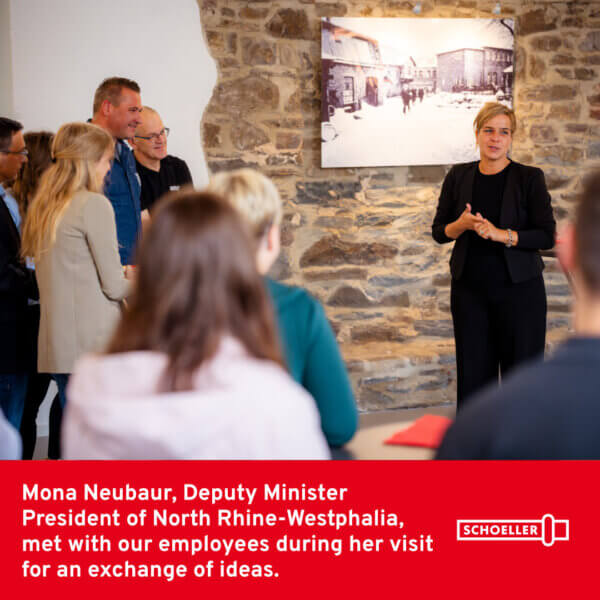Hellenthal, August 2, 2023 – Schoeller Werk GmbH & Co. KG, one of the leading manufacturers of welded and drawn premium stainless steel tubes in the European market, has adopted a roadmap to achieve climate neutrality. By 2030 at the latest, Schoeller aims to reduce its CO2 emissions by 40% and achieve full climate neutrality in its production processes by 2035. To accomplish this, the owners and management have decided to make extensive investments in reducing energy consumption, energy recovery, and entering into self-generation. During her visit to the Hellenthal facility, Mona Neubaur, Minister for Economic Affairs, Industry, Climate Protection, and Energy of the state of North Rhine-Westphalia, praised the exemplary nature of the transformation concept, which includes a combination of decentralized utilization of local energy infrastructure and the introduction of self-generation of electricity and green hydrogen.
Currently, companies in the steel and metal processing industry are facing various challenges, including rising energy and raw material prices, structural changes in the automotive and machinery sectors, a shortage of skilled workers, and expectations to establish carbon-neutral production. Despite these challenging conditions, Schoeller has decided against the trend to remain in Germany and further develop its production site in Hellenthal, NRW.
In order to sustain long-term growth and remain internationally competitive, Schoeller responded to the ongoing structural change and altered conditions with an extensive investment program several months ago. Essential for the site’s development is the continued optimization of work and production processes through increased standardization and automation, as well as a focus on profitable market segments. “Only through higher productivity and profitability can we secure our competitiveness and maintain the approximately 800 jobs at our Hellenthal site in the Eifel. Sustainability, including investment in our company’s carbon neutrality, is an essential aspect of our future viability,” describes Frank Poschen, CEO of Schoeller, the starting point.
Schoeller’s approved transformation concept includes investments in the range of tens of millions to reduce energy consumption, energy recovery, and the entry into self-generation of electricity and green hydrogen. The owners and management of Schoeller made it a condition to achieve CO2 reductions through specific measures in efficiency, substitution, and energy generation or procurement, rather than relying on certificates.
Some of the extensive measures include:
- Installation of photovoltaic systems on the stable hall roofs for self-power supply
- Optimization of existing heat and cold management, particularly heat recovery
- Infrastructure for capturing and reusing excess hydrogen with a recovery rate of 70%
- Self-generation of green hydrogen from photovoltaic and wind power, with a targeted connection to a local wind farm
- Hydrogen storage for load management
- Additional electricity generation through combined heat and power (CHP) using hydrogen surplus combustion
Schoeller is confident that based on the CO2 emissions of 12,489 t CO2 in 2021, the targeted reduction goal of -40% can be achieved by 2030 with the now adopted measures. Complete CO2 neutrality according to Scope 1 and 2 is achievable by 2035 at the latest, which is 10 years ahead of the target set by the German government for 2045.
Minister for Economic Affairs Mona Neubaur honors Schoeller’s pioneering role Today, Mona Neubaur, Minister for Economic Affairs, Industry, Climate Protection, and Energy, and Deputy Minister President of North Rhine-Westphalia, met with company representatives and employees of Schoeller in Hellenthal for discussions.
The minister emphasized that the North Rhine-Westphalian economy is currently in an ambitious transformation process towards a carbon-neutral future. To achieve this goal, companies must be capable and willing to invest significant resources in transformation, digitalization, climate neutrality, and modernizing their production.
She welcomed Schoeller’s commitment to these goals and its important contribution to the development of the hydrogen infrastructure. Ultimately, this technology will strengthen mechanical and plant engineering, the metal, and electrical industries throughout NRW.
“The industry in NRW ensures the competitiveness and prosperity of our state. We aim to become Europe’s first carbon-neutral industrial location. This is an ambitious goal that we can only achieve together with the local economy. Therefore, I welcome the site development plan from Schoeller Werk for the Hellenthal location, which includes the entry into self-generation of electricity and green hydrogen. The energy transition is a collective task, and Schoeller Werk is taking a pioneering role and setting a shining example,” said Mona Neubaur.
“With our transformation program, we also want to actively contribute to our customers’ value chain by reducing their CO2 emissions through decreased emissions from the upstream stage, and to make their products more sustainable,” said Poschen. Sustainability is not just a mere self-purpose for Schoeller. Additional reasons for the extensive investment in sustainability include a largely self-sufficient energy supply for the plant, higher production and delivery security, a positive external impact as a carbon-neutral company among customers and employees, and a strong demonstration of commitment to the region and the Eifel National Park.


